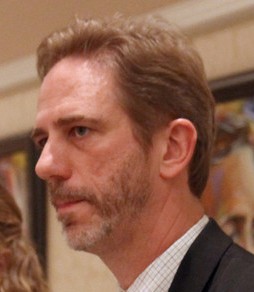By Katherine Manson
As Mercer University’s Distinguished University Professor of Christian Ethics, David Gushee takes on tough topics ranging from abortion, health care, immigration and the environment. As director of Mercer’s Center for Theology and Public Life, he encourages others to have sometimes-uncomfortable dialogue involving faith and public life.
“It’s important for social peace in our country,” Gushee said. “It’s important for humanizing the adversaries and showing why they think the way they think in order to learn from each other and grow in our own view and the maturity of our own positions. It’s important for our American religious communities to contribute constructively and not be destructive in conversation.”
For three years, the Center for Theology and Public Life has conducted civil dialogue on faith and current public issues on Mercer’s campuses in Macon, Ga., and Atlanta.
The center’s primary goal is to bring quality discussion of faith and policy issues to campus and to demonstrate civil conversations across differences, Gushee said. He acknowledged that approaching hot-button issues is not always easy to do.
 “Talking about religion is difficult, and talking about politics is difficult,” Gushee said. “We talk about all the issues that are difficult to talk about politely and try to demonstrate how to do that. It’s about civil dialogue and informed conversation.”
“Talking about religion is difficult, and talking about politics is difficult,” Gushee said. “We talk about all the issues that are difficult to talk about politely and try to demonstrate how to do that. It’s about civil dialogue and informed conversation.”
The center has worked alongside Mercer’s Local Engagement Against Poverty Conference to sponsor discussions on how to alleviate poverty in Macon and elsewhere. It has also co-sponsored a number of events for the Mercer Lyceum, a four-year, campus-wide initiative to spark discussions and harness the power of thoughtful dialogue.
As part of the Mercer Lyceum, the center hosted “Christian Faith, Moral Values, and Public Service: Two Views from Capitol Hill,” where participants gathered to discuss the federal health-care reform and the competing Christian perspectives. The dialogue of politics and religion continued in 2012 with a Lyceum event titled “Can We Find Common Ground on Abortion?”
The center’s work coincides with Gushee’s goals as an ethicist. He has written 15 books relating to the contributions of religion and public life. Three were published within the last six months.
Gushee said his most recent book, The Sacredness of Human Life, gives a good example of what he strives to do through his work. It involves an analysis of what it means to say that life is sacred, and he argues that it involves a wide range of moral commitments.
“The general agenda of making human life more human and treating everybody as if they are infinitely valuable, to me, that is what the sacredness of human life means,” Gushee said
In addition to his work at Mercer, Gushee travels to lecture at universities, seminaries and organizations around the world. His next trip involves traveling to Romania to speak on the issues of public life and faith. Though far reaching, his work has also deeply affected those at Mercer, particularly the students he teaches.
Isaac Sharp, a third-year master of divinity student at Mercer, has been to practically all of the center’s events in the last three years. As part of his internship with the Contextual Ministry class, Sharp has been shadowing Gushee to gain a better insight into his work.
“The center’s events have been enormously influential on me as I hope to follow in Dr. Gushee’s footsteps by one day helping to educate college and seminary students about constructive ways for people of faith to engage the public square,” Sharp said.
Mary Alice Morgan, senior vice provost for service learning and professor, said the center has changed the conversation for students at Mercer through its active work to engage in conflicting dialogue.
“Dr. Gushee has provided us with thoughtful and dynamic leadership in encouraging students, faculty and the university as a whole to come together as a community to focus on the hard issues, to have the hard conversations, within a framework of asking what serves the common good and how faith-based values can propel us toward living out a more just, equitable, caring society,” Morgan said. “The center calls us not simply to be faithful but to act upon our values by engaging in the public square.”
The center continues its work to build a more thoughtful agenda for faith and politics. It held a recent screening of a Christian documentary about Islam followed by discussion with the filmmaker.
In April, the center is organizing reciprocal visits with the historically African-American Morehouse College to talk about the 50th anniversary of Martin Luther King’s “Letter from Birmingham Jail.”
Morgan said part of the center’s goal is to advance Mercer’s religious mission as a historically Baptist institution since the university’s split with the Georgia Baptist Convention in 2005-2006.
“By sponsoring conferences and constructive dialogues on issues critically important to contemporary society — poverty, abortion, torture, immigration — the center places issues of ethics and faith squarely at the heart of the university,” Morgan said.
Gushee noted: “I want to bring programs that continue to show the value of that heritage and how it can be a constructive part of the contemporary life at Mercer.”
